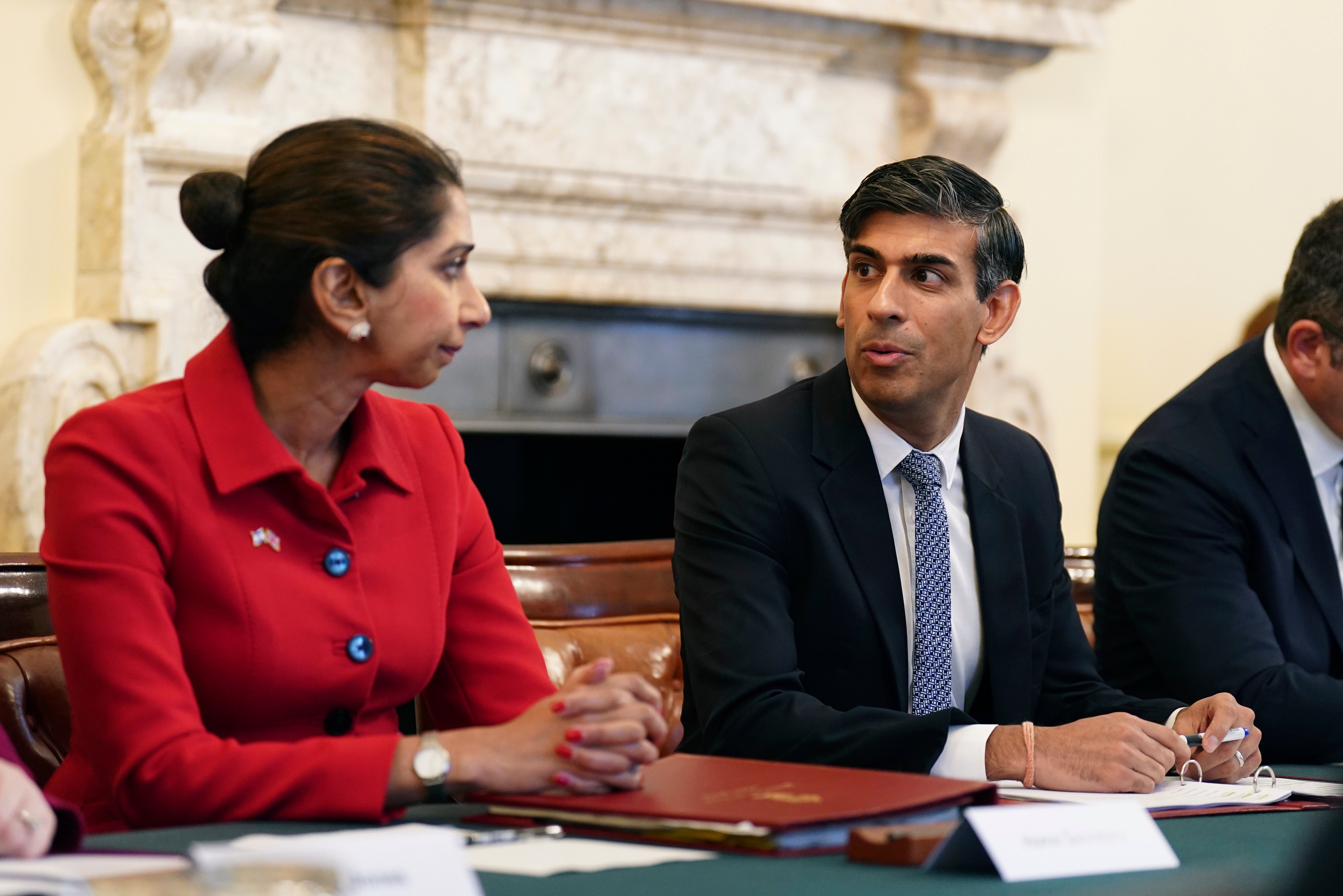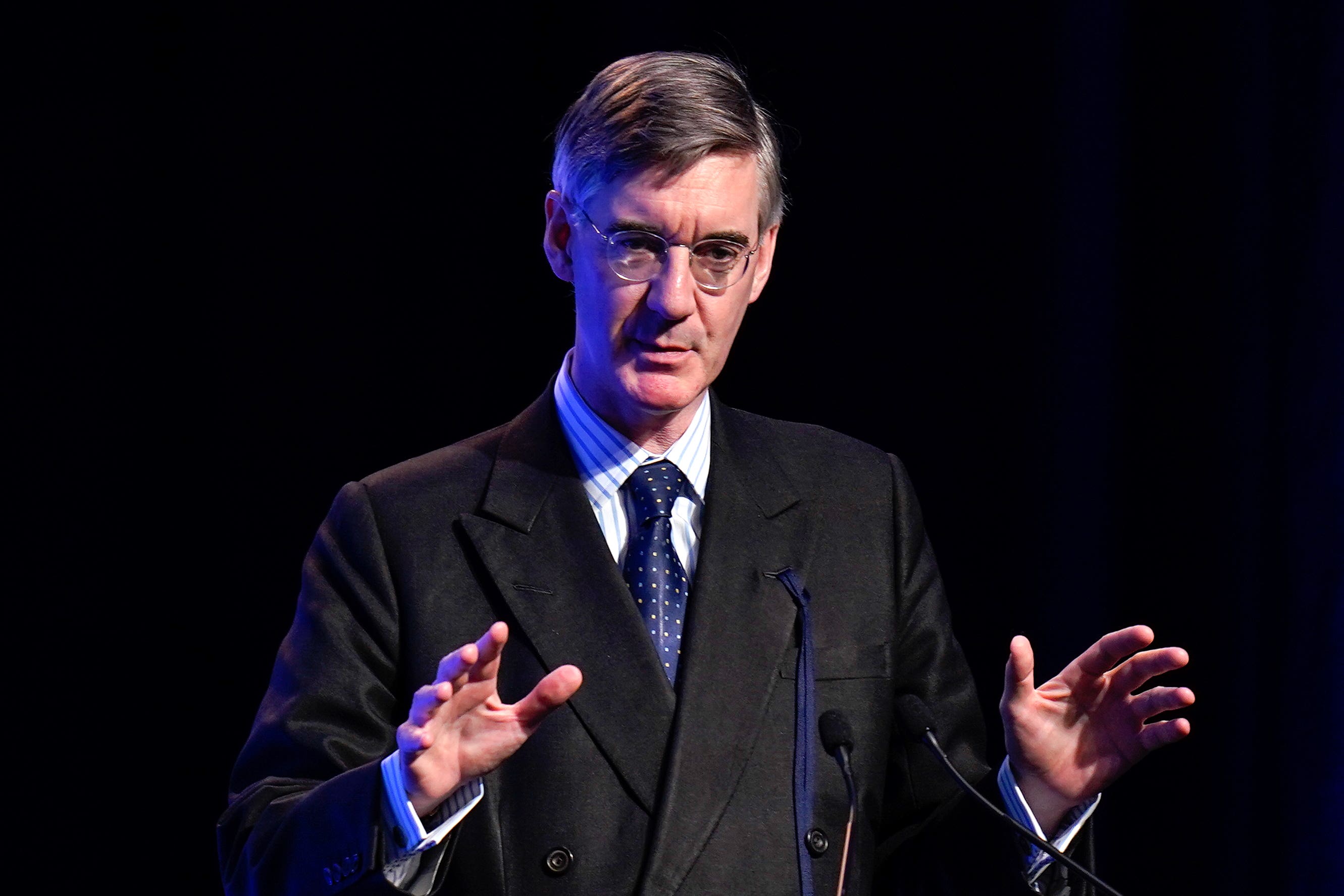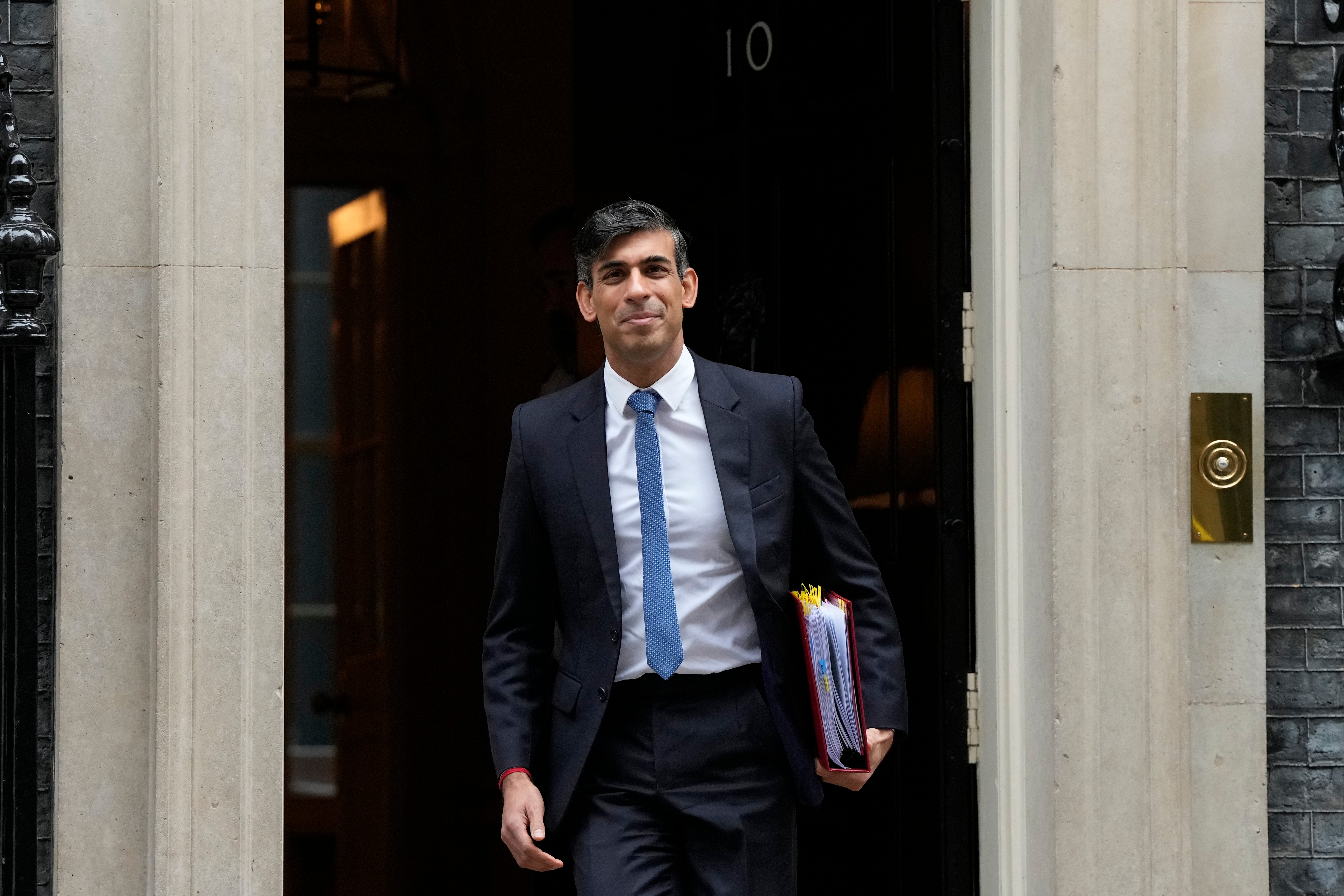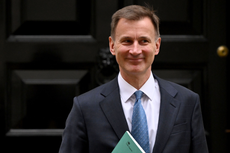Tories at war as Braverman attacks Sunak over ‘slap in face’ record migration numbers
PM feels heat from sacked home secretary as net migration triples from manifesto pledge to 750,000 a year – while party reels from backlash over ‘biggest tax cuts in history’
Suella Braverman has launched another stinging attack on Rishi Sunak – claiming the prime minister is to blame for the government’s “slap in the face” failure to stop immigration from hitting record highs.
In a fresh bout of infighting, the recently sacked home secretary joined right-wing Tories condemning the “embarrassing” net migration figures and called on the PM to take urgent steps to curb the numbers.
Ms Braverman said she had “pushed” a five-point plan to bring down numbers on legal net migration while in cabinet – suggesting Mr Sunak had refused to act. Challenging the PM, she asked: “When do we say: enough is enough?”
It comes as Mr Sunak and Jeremy Hunt suffered a backlash over their tax cut giveaway – with top economists warning that it puts Britain on course for public sector cuts even more “painful” than the austerity period of the 2010s.
In other developments:
- Right-wing Tory MPs backed Braverman’s plan for an overall cap on net migration
- Sir Jacob Rees-Mogg admitted to an “embarrassing” failure to control Britain’s borders post-Brexit
- No 10 said Sunak was “looking” at new ways to reduce migration numbers
- The Institute for Fiscal Studies accused Jeremy Hunt of leaving the next government a “mother of a headache” after tax cuts
- The chancellor was forced to deny being “fundamentally dishonest” after Tory claims tax cuts were “biggest in history”
- Economists found that UK households will be £1,900 poorer by end of this parliament.
Ms Braverman said she had pushed a five-point plan while she was home secretary – including an overall annual cap on net migration, as well as a new cap on the number of visas granted to foreign health and social care staff.
“We were elected on a pledge to reduce net migration,” she tweeted on X. “Today’s record numbers are a slap in the face to the British public who have voted to control and reduce migration at every opportunity.”
In typically fiery rhetoric, Ms Braverman said the government had allowed “an extra million people in just two years” – calling the numbers “unsustainable” before asking the PM: “When do we say: enough is enough?”

She also suggested raising the minimum salary threshold for overseas workers to £45,000 outside of NHS jobs, shutting the graduate visa route, and a new limit on the number of dependents that foreign staff can bring with them.
Official figures from the Office for National Statistics (ONS) showed net migration in 2022 hit 745,000 – a huge upward revision from an earlier estimate of 606,000.
It is more than triple the number the Tories promised to bring down at the last election. The figures also mean the population of England and Wales is growing at the fastest rate since 1962.
Former business secretary Sir Jacob told BBC Radio 4’s World at One that he was “embarrassed” about the “absolutely extraordinary” figures. “This is a phenomenally high level,” he added, arguing that excess immigration was to blame for shrinking GDP per capita.
Asked if he backed Ms Braverman’s plan for an overall cap on annual numbers, Sir Jacob said he was “not unsympathetic” to the radical move. “I am in favour of getting this number down very significantly. A cap is one way of doing it.”

In an extraordinary admission, the former Brexit opportunities secretary also said there had been a serious political failure in controlling Britain’s borders post-Brexit.
Ms Braverman also claimed that Brexit “gave us the tools” to cut immigration, but the government had failed to act. “It’s time to use them. We must act now to reduce migration to sustainable levels,” she said.
The New Conservatives group of around 35 right-wing Tory MPs aligned with Ms Braverman’s views said the latest figures were “existential” for the party and demanded urgent action from Mr Sunak.
The group run by Danny Kruger and Miriam Cates called for a “comprehensive” plan to bring net migration below the 229,000 mark – the figure at the 2019 election when a manifesto promise to bring down numbers was made.
In an ominous warning, they said they would “assess” any measures brought forward by Mr Sunak, adding that the PM “must act now”. They added: “The word ‘existential’ has been used a lot in recent days but this really is ‘do or die’ for our party.”
Home secretary James Cleverly brushed off the record-high migration numbers. “This figure is not showing a significant increase from last year’s figures and is largely in line with our own immigration statistics.”
However, Mr Sunak is planning a series of new immigration crackdown measures as he prepares to head off a Tory backbench revolt.
The PM is said to be preparing to cut the number of relatives foreign healthcare workers can bring into the UK to only one, ditching the shortage occupation list, and raising the minimum salary requirement from £26,200 to £31,000.
But it may not be enough to dampen anger. Senior Conservative MP David Jones said the figures were “very troubling”, calling for Mr Sunak to consider Ms Braverman’s idea of an overall cap on migration numbers.
The deputy chief of the Tories’ European Research Group (ERG) told The Independent that the government should also stop students bringing family members “and make sure they return after their studies”.
Tory MP Sir Simon Clarke said the level was “unsustainable”, adding that there is “no public mandate” for it. Fellow ex-minister Neil O’Brien said that Mr Sunak must now take “immediate and massive action”.
Tory MP Jonathan Gullis said the figures were “completely unacceptable” and would “rightly anger” the British people, as he too called for drastic action, including a crackdown on foreign students’ dependents.
Work and pensions secretary Mel Stride said the immigration figures were “unacceptable”. Asked about the statistics on Friday, he told Times Radio: “I think the fundamental point here is that these figures we recognise are far too high. They are unacceptable and that is why we have been taking action.”

Asked whether the government would cut the number of visas, Mr Sunak’s spokesman said “it is important that we strike the right balance” to help deal with “short-term pressures”.
But the No 10 official added: “We do believe there is further to go here and that’s why we’re keeping it under review,” saying officials were “looking at other areas where we can make further reductions”.
The ONS said it was too early to tell if this was the start of a new downward trend, but that the most recent estimates indicate a slowing of immigration.
Professor Brian Bell, chairman of the independent Migration Advisory Committee, said net migration to the UK is likely to fall in the next few years. “I think the indications are that we’ve reached the peak,” he told the BBC.
Labour leader Sir Keir Starmer has said the net migration figure was “shockingly high”. Shadow home secretary Yvette Cooper attacked the Tories “abysmal record on skills, training and workforce planning”.
She called for an end to the 20 per cent wage discount on the shortage occupation list, which allows some employers to reduce wages and recruit from overseas to help fill gaps in key sectors.
Meanwhile, the Institute for Fiscal Studies accused Mr Hunt of failing to set out a credible plan for “harsh” spending cuts ahead, warning they would have to be “more painful” than those delivered by David Cameron and his chancellor George Osborne.
IFS director Paul Johnson said Mr Hunt’s “successor is going to have the mother and father of a headache when it comes to making the tough decisions implied by this statement”.
The chancellor clashed with BBC Radio 4 host Nick Robinson after the broadcaster told him the Tory claim of the “biggest ever” tax cuts was “fundamentally dishonest”.
Mr Hunt disagreed and defended his package. “I did make a start in bringing down the tax burden. I’ve never said that we were going to get there all in one go.”
The Resolution Foundation said the fall in real household incomes over the course of this parliament amounted to an average of £1,900.
Join our commenting forum
Join thought-provoking conversations, follow other Independent readers and see their replies
Comments



Bookmark popover
Removed from bookmarks